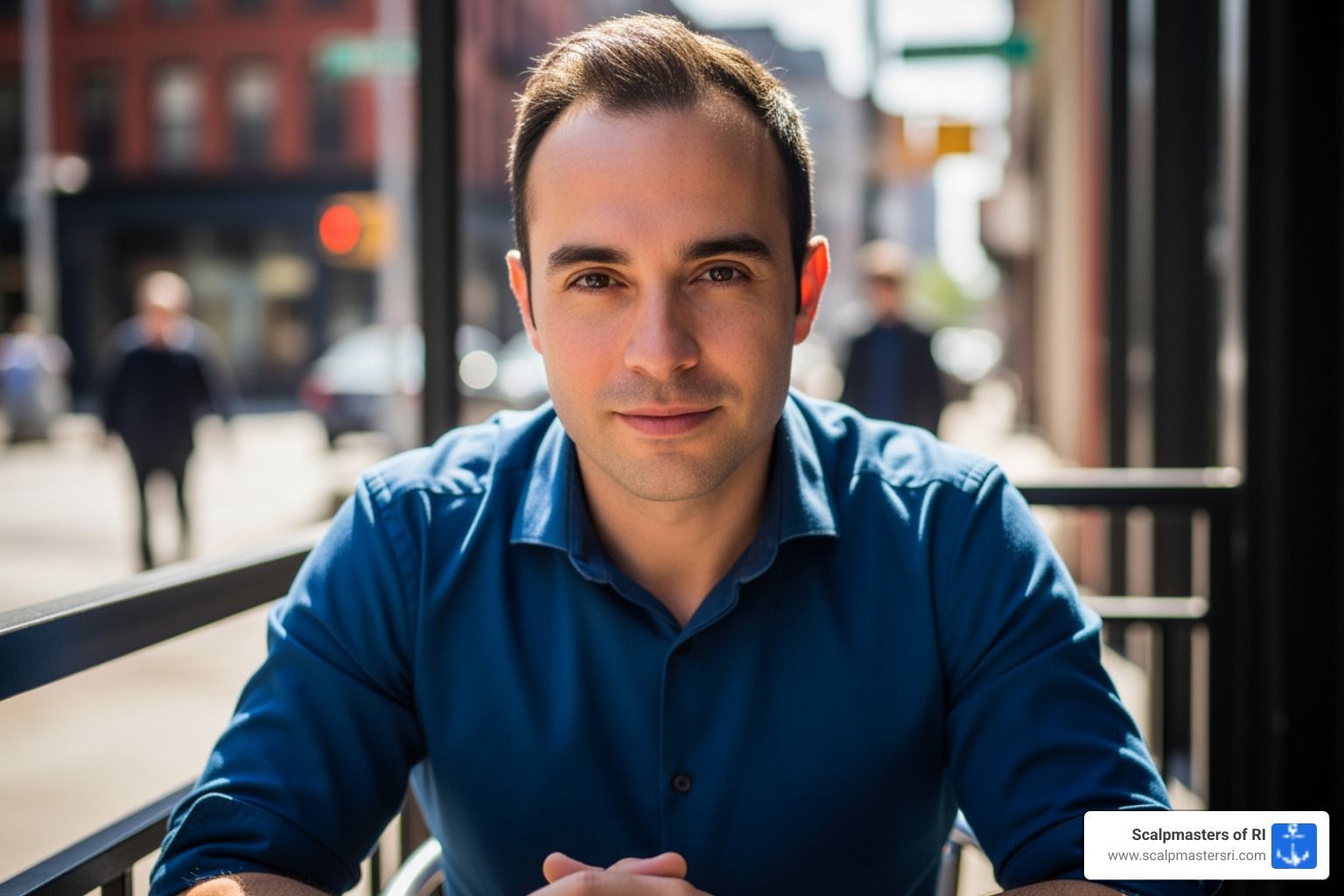Does Anesthesia Cause Hair Loss?
Does Anesthesia Cause Hair Loss?
Anesthesia is a medical marvel, allowing for pain-free surgeries and medical procedures. However, many patients express concerns about its potential side effects, one of which is hair loss. While the relationship between anesthesia and hair loss is much debated, understanding the facts can help patients make informed decisions. Does ansesthesia make your hair fall out? Will anesthesia cause hair loss? At Scalpmasters of Rhode Island, we can provide you with a wealth of useful information that can help you address hair loss.

Understanding Anesthesia: The Basics
Anesthesia is used in various medical procedures to block pain, relax the body, or make the patient unconscious. It works by interfering with nerve signals in the body, ensuring that patients don't feel pain during surgeries. There are multiple types of anesthesia, each tailored for different procedures and patient needs. Although it provides immense relief, anesthesia isn't without its potential side effects.
Different Types of Anesthesia
Anesthesia can be broadly categorized into general, regional, and local types. General anesthesia renders the patient unconscious and is used for major surgeries. Regional anesthesia targets a larger part of the body, like an arm or leg, while local anesthesia is used for smaller areas. Each type has its unique application and potential side effects.
How Anesthesia Works in the Body
When administered, anesthesia affects the central nervous system. It interrupts the nerve signals traveling to the brain, ensuring that sensations, especially pain, aren't felt. The body's reflexes are also temporarily paused, allowing surgeons to operate without involuntary movements. The duration and depth of its effect depend on the type of anesthesia and the dosage administered.
Common Side Effects of Anesthesia
Can anesthesia cause hair loss? It is not among the most common side effects, which include:
- Nausea or vomiting: Some patients might feel nauseous or vomit after regaining consciousness. It can be due to a combination of the anesthesia and other medications used during surgery.
- Memory lapses: It's not uncommon for patients to have brief memory lapses or feel disoriented post-surgery.
- Dizziness or drowsiness is a temporary side effect that usually diminishes as the anesthesia wears off.
- Mild allergic reactions: In rare cases, patients might experience allergic reactions like itching or a rash.
- Difficulty urinating: Anesthesia can sometimes affect the urinary muscles, causing temporary challenges in passing urine.
Understanding the common side effects of anesthesia can prepare patients for what to expect. While most of these side effects are temporary, it's crucial to communicate any prolonged or severe symptoms to your healthcare provider.
Can Anesthesia Make Your Hair Fall Out?
The question, "does general anesthesia cause hair loss?" has been researched and studied for years. While anesthesia can be linked to hair shedding, it might not be the sole culprit. Hair loss post-surgery can be attributed to a combination of factors, with anesthesia being just one potential contributor.
Factors Contributing to Post-Surgery Hair Loss
Can general anesthesia cause hair loss? There are different forms of hair loss, and many factors could contribute to healthy hair or thinning hair falling out. Some of the key factors include:
- Stress: Major surgery can be a significant stressor, potentially triggering hair shedding.
- Medications: Other medications used during surgery might have hair loss as a side effect.
- Physical trauma: The body's response to physical trauma from surgery can sometimes cause hair loss.
- Nutritional deficiencies: Post-surgery diets or reduced appetite can lead to deficiencies, impacting hair health.
- Hormonal imbalances: Surgery can sometimes impact hormonal levels, indirectly affecting hair growth.
While anesthesia might play a role in post-surgery hair loss, considering these other factors provides a holistic understanding. A multi-pronged approach can better address post-surgery hair shedding.
Duration of Anesthesia's Impact on Hair Health
Hair loss related to anesthesia is often temporary, yet it can be a concern for many people. Typically, patients might begin to notice increased hair shedding several weeks to months post-surgery. This phenomenon is frequently attributed to a natural response known as telogen effluvium, where hair growth cycles experience temporary disruption. While alarming at first, most patients relax later, as the hair growth often resumes its normal cycle within a few months.
Understanding the duration and potential impact of anesthesia on hair health is crucial. Knowledge equips patients with realistic expectations and helps mitigate undue stress. It's also important to recognize that individual experiences may vary, with some seeing quicker recovery than others. Regular consultation with healthcare providers ensures timely interventions if needed.
Other Factors That Contribute to Hair Loss After Surgery
Beyond just anesthesia, surgical procedures can exert physical and emotional strains on the body. Such stressors can lead to physiological changes that might contribute to hair loss. Factors include reduced food intake post-surgery, the body's natural response to trauma, and the overarching emotional stress of the surgical experience. It's essential to consider these factors as potential contributors to hair loss.
By recognizing these triggers, patients can adopt measures to minimize their effects. A balanced diet, stress management techniques, and proper post-operative care can make a difference. Equally important is open communication with healthcare providers, ensuring that any concerns are addressed promptly. Being proactive can pave the way for a smoother recovery journey.
Telogen Effluvium: A Temporary Hair Loss Phenomenon
Telogen effluvium, a form of hair loss, emerges when a significant percentage of hair follicles prematurely enter the resting phase. This transition can result in a noticeable increase in hair shedding, often causing distress to individuals. Common triggers for this phenomenon include major life events such as surgery, significant stress, or sudden illness. The silver lining is that telogen effluvium is typically temporary, with many experiencing a return to regular hair growth patterns over time.
Awareness of telogen effluvium can provide comfort to those witnessing sudden hair shedding. Understanding that it's a natural, temporary response can reduce anxiety. Maintaining a healthy lifestyle during such phases is advisable, supporting the body's natural healing process.
Tips to Prevent Hair Loss Post-Surgery
- Maintain a balanced diet: Ensure you're getting all essential nutrients, promoting healthy hair.
- Limit stress: Engage in relaxation techniques like meditation or deep breathing exercises.
- Avoid harsh hair treatments: Minimize the use of chemicals or heat on your hair post-surgery.
- Consult a dermatologist: If you notice excessive hair shedding, seek professional advice.
- Use gentle hair products: Opt for mild shampoos and conditioners to reduce potential damage.
By following these tips and maintaining open communication with your healthcare provider, you can mitigate the chances of post-surgery hair loss.
Treatment Options for Anesthesia-Related Hair Loss: Scalp Micropigmentation (SMP)
Scalp Micropigmentation (SMP) is an innovative solution for those experiencing hair loss post-surgery. At Scalpmasters of Rhode Island, we specialize in this technique, ensuring the best possible results for our clients. By depositing pigment into the scalp, SMP creates the appearance of hair follicles, providing a fuller look. This non-invasive solution offers immediate results and instills a renewed sense of confidence in individuals.
SMP stands out as a preferred choice for those wary of surgical treatments or medications. It provides a natural-looking solution to hair loss, requiring minimal maintenance. With expert practitioners at Scalpmasters, clients can expect precision and care in every session. Reclaim your confidence and redefine your look with our expert SMP treatments.
Contact Scalpmasters of Rhode Island for Anesthesia Hair Loss Treatment Today
At Scalpmasters of Rhode Island, we understand the impact of hair loss on self-esteem. Our team of professionals is dedicated to helping you regain your confidence. Whether you're considering SMP or seeking advice on post-surgery hair health, we're here to help. Reach out today and take a step towards a more confident you.
Learn More
What's New
Latest Hair Loss Solutions & Guides




